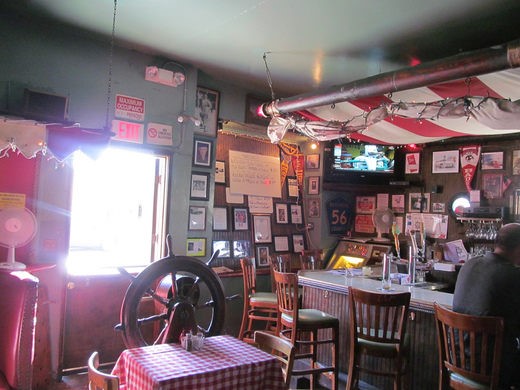by G. Murphy Donovan (September 2019)
Sunset at Paso Robles, Juan Guzman
There is nothing noble in being superior to your fellow men. True nobility lies in being superior to your former self. —Ernest Hemingway
Obituaries are always a bridge too far, lives condensed in rhetorical shorthand. Obits are inadequate to be sure, but it’s what we do when mere words are all that is left.
 What can you possibly say or write that will capture a lifetime, the merits of a man who lived for the better part of a century? The short answer is nothing much. Or, as Pericles allowed, and Lincoln echoed; the best that the heroic dead can hope for is to live on in the hearts of others.
What can you possibly say or write that will capture a lifetime, the merits of a man who lived for the better part of a century? The short answer is nothing much. Or, as Pericles allowed, and Lincoln echoed; the best that the heroic dead can hope for is to live on in the hearts of others.
Memory is immortality.
So what’s to remember about Alex Alexiev?
For me, the memories were personal. We were born days apart during WWII. As children, he was captive to Communists; I was captive to a Bronx orphanage. As an adult, Alex was consigned to a labor battalion for being the son of a famous satirist, artist, and patriot. He escaped to the west in 1968, the year of my first tour in Vietnam. I met Alex in the early 80s at RAND Corporation, Santa Monica. Over the years, we spent many a day colluding around campfires with adult beverages under the pretense of hunting crabs, prawns, or salmon.
Read more in New English Review:
• Whisper Louder Please
• Days and Work (Part 3)
• The Ayatollah of Climate Change: Greta Thunberg
Alexiev’s father was tortured and killed by Bulgarian Communist collaborators in 1944. Then, as now, socialists didn’t have a sense of humor. Mother Alexiev subsequently endured the Bulgarian gulag for over a decade.
Mama and sons eventually made it to Germany, apparently not then far enough West. Alex became a Stassi house guest in Munich where he put detention to good use by becoming fluent in German. AA was a natural linguist, speaking German, English, French, Russian, and a taste of Italian in addition to his native Bulgarian.
I once asked Alexiev about his affinity for language and he replied that fluency was very useful if you ever wanted a date. Alex was a lifelong practicing heterosexual on at least three continents.
When he finally got to free Europe, Alexiev maintained himself with manual labor; construction jobs, gambling, and even a little pinball hustling. I have a vintage pinball machine at home. After all these years, the high game still reads AA.
Eventually, Alexiev came to Hemingway’s America. Alex had been an English major in Sophia and thereafter a lifelong Hemingway aficionado. Again, working with his hands as an electrician’s apprentice, Alexiev eventually landed in Los Angeles at UCLA where he became one of Bernard Brodie’s political science graduate students.
At the time, Brodie was Herman Khan’s sparring partner in those infamous nuclear policy debates. Brodie was the erudite spouse of Fawn Brodie, iconoclastic historian who set the record straight on Thomas Jefferson and Joseph Smith.
Brodie sponsored Alex at RAND Corporation, first as an intern then as an analyst. Eventually, Alexiev became a senior researcher; one of few, if not the only scholar, to hold that position without a PhD.
Alex was a lifelong conservative, a world view born of real world experience with the perils of European social and political naiveté. You could say that the RAND Corporation and Alex Alexiev ran on parallel tracks during the Cold War. The RAND/Alexiev rift is a cautionary tale about how institutions begin with good ideas only to become the enemy of ideas over time.
RAND was an artifact of WWII, a think tank sponsored at first by General Hap Arnold, later by Stanley Kubrick and Doctor Strangelove.
In the beginning, RAND concentrated on the post-war USAF strategy and the heavy lifting of nuclear policy. Early research was focused and consequential. Ideas like “deterrence” and mutually assured destruction (MAD) germinated on Main Street in Santa Monica.
RAND was situated on the west coast, originally, to put some distance between Washington politics and impartial analysis. Alas, politics at RAND might realistically be divided into two eras; before and after Daniel Ellsberg.
Ellsberg, you may recall, was the anti-war zealot who reproduced and gave the NY Times a RAND copy of the Robert McNamara’s top secret Pentagon Papers.
Donald Rice, later to become Secretary of the Air Force, was brought in as president to deal with the Ellsberg mess. Rice rewrote the research agenda at RAND. He expanded the menu from strategic to domestic with all the hobby horse analysis that “diversity” came to include. Indeed, RAND had a gay studies unit long before LGBT was a thing.
John Kennedy once said that if you don’t get the national security thing right, nothing else mattered. Rice and his successors never got Jack’s memo.
At RAND, Ellsberg was a stereotypical example of the politicized “scientific” and social research that would come to dominate the schoolhouse and think tanks after the Vietnam War.
Ironically, the impartial and non-partisan objectivity sought by the Air Force for RAND in the beginning was compromised by both Ellsberg and geography. By 1990, Santa Monica was literally the “left coast.”
At the turn of the Century, a weekend pool party for Randites might be clothes optional, where the refreshments would include a bong, bimbos, a bag of weed, lines of coke, and a large bowl of M&Ms. In the last quarter of the 20th Century, California, especially Santa Monica, was as far left as you could get without getting wet.
RAND goes with the flow, then and now. When asked to assess the research agenda at RAND today, a senior analyst quipped that “mother RAND” had become just one of many Beltway whores, pedaling “non-profit” paper on any subject to city, state, federal, and foreign apparatchiks unable or unwilling to think for themselves.
The think tank racket today is the poster child example of the revolving door, a kind of musical chairs for the many credentialed barnacles in the deep state or the academy.
As academia, California, indeed the country, moved left, pragmatic intellectuals like Alexiev became inconvenient noise. The actual parting with RAND was not sweet sorrow, however. The Cold War thaw at the end of the 20th Century provided the excuse for Alexiev and the beltway bandits to go their separate ways.
 The denouement with RAND came with the fall of the Berlin Wall. As the Warsaw Pact sunk into the dustbin of history, Bulgaria elected its first democratic president, Philip Dimitrov (left) in 1991. The Alexievs were one of Bulgaria’s first families. As a professional anti-Communist scion, Alex immediately offered his pro bono services to the new prime minister as an informal American advisor.
The denouement with RAND came with the fall of the Berlin Wall. As the Warsaw Pact sunk into the dustbin of history, Bulgaria elected its first democratic president, Philip Dimitrov (left) in 1991. The Alexievs were one of Bulgaria’s first families. As a professional anti-Communist scion, Alex immediately offered his pro bono services to the new prime minister as an informal American advisor.
By this time, Alexiev was a US citizen.
Dimitrov needed all the help he could get, if tenure is a measure of merit. By trade, Philip was at first a psychotherapist, then a lawyer. Not really strange bed fellows if you think about it long enough.
As bad luck would have it, Donald Rice, former president of RAND and then Bush era Secretary of the Air Force, was visiting Bulgaria in those early days of democracy. Rice was startled to see one of his former RAND analysts at Prime Minister Dimitrov’s elbow. Secretary Rice apparently communicated his angst about Alex back to his successor, Jim Thompson, at RAND whence Alexiev was summarily fired, ostensibly for “vacating” his California cubicle without a fare-thee-well from Mahogany Row.
Apparently, neither Alexiev nor the Bulgarian prime minister had obtained approvals from RAND or Washington for any pro bono collusion. Doing stuff for free isn’t the RAND way. When Thompson literally locked AA out of his office, the inevitable wrongful termination law suit followed.
The plaintiff lost. The RAND victory was a function of pricey San Francisco lawyers and irony.
RAND practically invented the “telecommuting” meme, the “work from home” shibboleth. Nobody at RAND ever cared about how much time you spent in your cubicle as long as you could type or sell feathers. Alas, “working at home” for your homeland, as Alexiev had done, was apparently not the same as working at home from Venice Beach.
If the truth be told, Alexiev v. RAND was a tedious and expensive excuse to purge an independent soul trying to do the right thing. No matter, RAND by then was just another “non-profit” racket where taxpayers paid the bills for defense lawyer—and “research,” real or imaginary.
 After RAND, Alex Alexiev retreated to the hills east of Paso Robles to plant an olive grove and grapes on a scenic hilltop. He had always been an avid cook, gardener, hiker, camper, fisherman, and hunter. Now he put in nearly a thousand olive trees and several hundred grape vines, fruit, and nut trees—by hand.
After RAND, Alex Alexiev retreated to the hills east of Paso Robles to plant an olive grove and grapes on a scenic hilltop. He had always been an avid cook, gardener, hiker, camper, fisherman, and hunter. Now he put in nearly a thousand olive trees and several hundred grape vines, fruit, and nut trees—by hand.
Alexander Alexiev was that rare analog man fated to be tormented by binary harpies.
Nevertheless, AA kept his hand in the national security game by doing the occasional study for Andy Marshall’s Net Assessment Office at the Pentagon. Over a lifetime he was also an associate and colleague of S. Enders Wimbush, Director of Radio Liberty. Eventually, Alex also co-founded a think tank of his own in Sophia, Bulgaria Analytica.
To the end, Alexiev used tools like Analytica to advance the course of democracy in Bulgaria and East Europe.
In the early days of the Muslim wars in South Asia, Alex audited the Pakistan/Afghanistan border just to get a dirt level view of the Mujahedeen. His side kick was the redoubtable Gordon McCormick, now dean at the Naval Post- Graduate School in Monterey. At the time, the enemy was Soviet. Thus, tribal militias were then called “freedom fighters” by the American press.
When the Russians departed, Washington couldn’t take yes for an answer. They left, we stayed. Since 1989, with American tutelage, the Taliban and ISIS, toxic heirs of the Mujahedeen, turned Afghanistan into the opium funded, failed terror state that we know today.
Alexiev, the analyst, unlike apologist colleagues, never had any illusions about Islamic politics or the reality of global jihad. It wasn’t just contrarian analysis that separated Alexiev from the pack; his world view was nothing short of analog.
Pasha Gordon recalled Alexiev in the field, trekking through the South Asia war zone.
Alex’s contacts in Peshawar were incredible. We traveled up and down the Afghan-Pakistani frontier, to include Baluchistan. We met with numerous Mujahideen Cdrs. and staff from numerous different fighting groups and political parties. We never met Massoud . . . “We spent most of one day interviewing Soviet POWs (former soldiers) being held by the Mujahideen in Peshawar! Alex had them write letters home (to let their families know they were alive) and he mailed them from England on our way back to the US . . . This was the first time I heard of Bin Laden. He was already developing his organization at this time and was based in University Town in Peshawar, where we spent a lot of time . . . We collected enormous amounts of unique, insider information during these trips.
Like Hemingway, Alexiev knew the difference between motion and action.
.jpg) He was contemptuous of analysts, or “experts,” with no real world experience, no dirt under their nails, no tempering beyond classroom, podium, or political sinecures. Alex believed that true intelligence was a product of mixed signals, both manual and mental.
He was contemptuous of analysts, or “experts,” with no real world experience, no dirt under their nails, no tempering beyond classroom, podium, or political sinecures. Alex believed that true intelligence was a product of mixed signals, both manual and mental.
He was often the smartest guy in the room. If you didn’t believe that, all you had to do was ask. His arrogance could be insufferable and rational at the same time. In his salad days at RAND, he was surely suffocated by hosts of credentialed morons.
Still, he understood, like few people I ever knew, that human intelligence, in the beginning, flowed from opposable thumbs, manual skills, men who actually worked for a living. Only a skilled hand paints a Mona Lisa or coaxes a milkshake from a goat.
And the use of tools is, indeed, the only way to parse fake men from real monkeys.
Alexiev believed that sound judgement came with an appreciation of physical labor, agrarian roots, and experience. For him, you needed to do something, do anything, with your hands besides molest a keyboard or poke a cell phone . For Alexiev, reflection, like judgement and wisdom, is watered by sweat equity.
Critics might call Alexiev a loose cannon. A more charitable view saw him as difficult – at times. In either case, he did not suffer fools gladly. Alas the world of academia, think tanks, and national security politics was, and still is, fecund with politically correct poseurs and hustlers.
It’s a wonder that the federal swamp didn’t swallow Alexiev long before it spat him out.
Read more in New English Review:
• China’s Space Dream is America’s Nightmare
• Sally Rooney’s Palpable Designs
• Advanced Artificial Intelligence and Ilhan Omar
He always stood out because he was different—and uniquely talented. For him, a label like maverick was a compliment. He made up life as he went along. And he always looked forward to exposing the next fakir.
Withal, Alexander R. Alexiev was a great guy to be around in fair weather or foul. His courage was legendary. He also made the best martinis, dumplings, and elk saddle west of the Mississippi.
With his passing, the collective IQs of Bulgaria and America have dropped by several points.
Va bene my friend!
«Previous Article Table of Contents Next Article»
__________________________________
 G. Murphy Donovan was the senior USAF research fellow at RAND Corporation in the early 1980s. He has fond memories of many dive bar staff meetings at booth one, first right after the door, Chez Jays (right) on Ocean Blvd, Santa Monica. Lee Marvin, USMC, often attended.
G. Murphy Donovan was the senior USAF research fellow at RAND Corporation in the early 1980s. He has fond memories of many dive bar staff meetings at booth one, first right after the door, Chez Jays (right) on Ocean Blvd, Santa Monica. Lee Marvin, USMC, often attended.
Follow NER on Twitter @NERIconoclast








